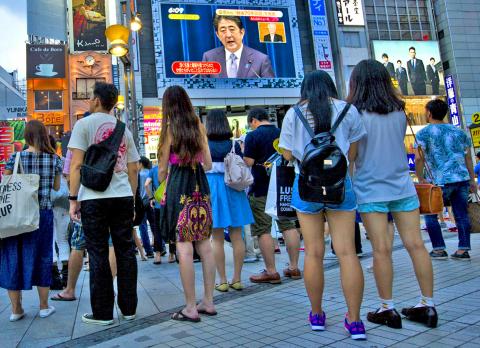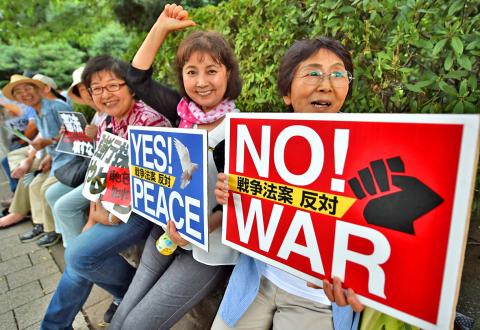Japanese Prime Minister Shinzo Abe yesterday expressed “utmost grief” for the suffering Japan inflicted in World War II and vowed that Japan would never again use force to settle international disputes, but he said that future generations of Japanese should not have to keep apologizing for the mistakes of the past.
Abe, marking the 70th anniversary of the end of the war, also said he upheld past official apologies, including a landmark 1995 statement by then-prime minister Tomiichi Murayama, but the conservative leader offered no new apology of his own.
The legacy of the war still haunts relations with China and South Korea, which suffered under Japan’s sometimes brutal occupation and colonial rule before Tokyo’s defeat in 1945.

Photo: Reuters
Beijing and Seoul had made clear they wanted Abe to stick to the 1995 “heartfelt apology” for suffering caused by Tokyo’s “colonial rule and aggression.”
“Upon the innocent people did our country inflict immeasurable damage and suffering,” Abe said in a statement. “When I squarely contemplate this obvious fact, even now, I find myself speechless and my heart is rent with the utmost grief.”
“In Japan, the post-war generations now exceed 80 percent of its population. We must not let our children, grandchildren and even further generations to come, who have nothing to do with that war, be predestined to apologize,” Abe said.

Photo: AFP
“Still, even so, we Japanese, across generations, must squarely face the history of the past,” he said.
Abe, who referred to the wartime sufferings of the Chinese in his statement, said he hoped Beijing would recognize Japan’s “candid feelings” and that he hoped to meet Chinese President Xi Jinping (習近平) if the opportunity arose.
He later told a news conference that attempts to “change the ‘status quo’ by force” were unacceptable.
Abe said Japan should “never forget that there were women behind the battlefields whose honor and dignity were severely injured,” but he made no direct reference to “comfort women.”
Abe said that Japan took the “wrong course and advanced along the road to war,” but his statement did not specifically refer to what a report by his own advisers had called Tokyo’s “aggression” in China after 1931.
Abe told the news conference that the question of whether a specific act was “aggression” should be left to historians.

MAKING WAVES: China’s maritime militia could become a nontraditional threat in war, clogging up shipping lanes to prevent US or Japanese intervention, a report said About 1,900 Chinese ships flying flags of convenience and fishing vessels that participated in China’s military exercises around Taiwan last month and in January last year have been listed for monitoring, Coast Guard Administration (CGA) Deputy Director-General Hsieh Ching-chin (謝慶欽) said yesterday. Following amendments to the Commercial Port Act (商港法) and the Law of Ships (船舶法) last month, the CGA can designate possible berthing areas or deny ports of call for vessels suspected of loitering around areas where undersea cables can be accessed, Oceans Affairs Council Minister Kuan Bi-ling (管碧玲) said. The list of suspected ships, originally 300, had risen to about

DAREDEVIL: Honnold said it had always been a dream of his to climb Taipei 101, while a Netflix producer said the skyscraper was ‘a real icon of this country’ US climber Alex Honnold yesterday took on Taiwan’s tallest building, becoming the first person to scale Taipei 101 without a rope, harness or safety net. Hundreds of spectators gathered at the base of the 101-story skyscraper to watch Honnold, 40, embark on his daredevil feat, which was also broadcast live on Netflix. Dressed in a red T-shirt and yellow custom-made climbing shoes, Honnold swiftly moved up the southeast face of the glass and steel building. At one point, he stepped onto a platform midway up to wave down at fans and onlookers who were taking photos. People watching from inside

Japan’s strategic alliance with the US would collapse if Tokyo were to turn away from a conflict in Taiwan, Japanese Prime Minister Sanae Takaichi said yesterday, but distanced herself from previous comments that suggested a possible military response in such an event. Takaichi expressed her latest views on a nationally broadcast TV program late on Monday, where an opposition party leader criticized her for igniting tensions with China with the earlier remarks. Ties between Japan and China have sunk to the worst level in years after Takaichi said in November that a hypothetical Chinese attack on Taiwan could bring about a Japanese

The WHO ignored early COVID-19 warnings from Taiwan, US Deputy Secretary of Health and Human Services Jim O’Neill said on Friday, as part of justification for Washington withdrawing from the global health body. US Secretary of State Marco Rubio on Thursday said that the US was pulling out of the UN agency, as it failed to fulfill its responsibilities during the COVID-19 pandemic. The WHO “ignored early COVID warnings from Taiwan in 2019 by pretending Taiwan did not exist, O’Neill wrote on X on Friday, Taiwan time. “It ignored rigorous science and promoted lockdowns.” The US will “continue international coordination on infectious